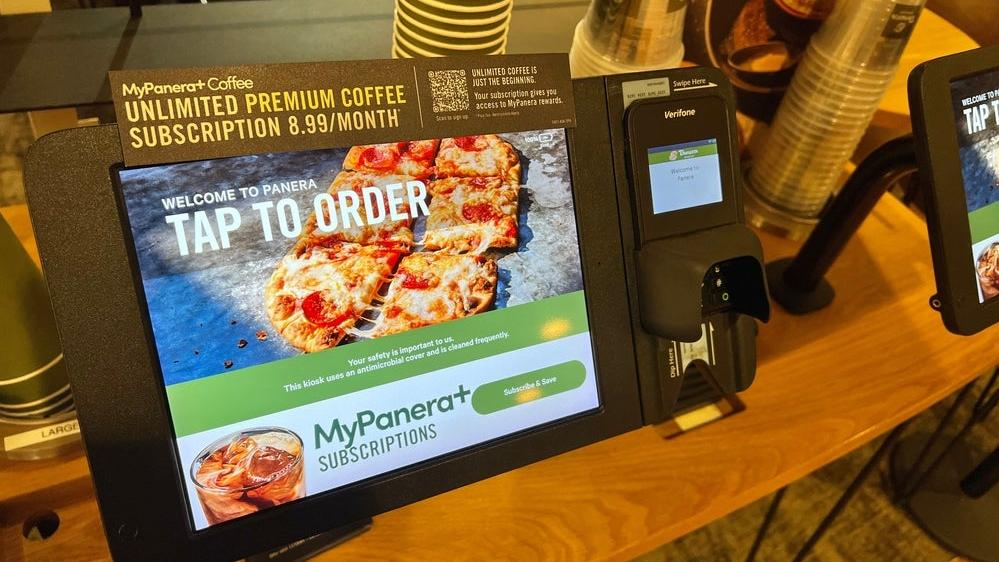Panera Has Changed The Labels On Its 'Charged' Lemonade
A 21-year-old woman with a heart condition died after drinking Panera’s highly caffeinated lemonade.
Update, October 30, 2023: Although the lawsuit regarding Panera's Charged Lemonade is still ongoing, the restaurant chain has apparently taken steps to more clearly inform customers about the caffeine in these drinks.
Nation's Restaurant News reports Panera has updated its in-store disclosures by adding a bold label indicating that the Charged Lemonade "Contains Caffeine." The lemonades also now have a label reading "use in moderation" and a warning that the drink is not recommended for "children, people sensitive to caffeine, pregnant or nursing women." These warnings have also been added to the Panera website and app.
The FDA is currently investigating the potential dangers of Panera's Charged Lemonade drinks following the death of a customer who consumed them.
"The FDA is saddened to hear of the passing of a consumer and as always, takes seriously reports of illnesses or injury from regulated products," an FDA spokesperson said in a statement to NRN. "The agency monitors the marketplace of FDA-regulated products and takes action when necessary."
Original post, October 25, 2023: A lawsuit filed in Philadelphia on Monday seeks compensatory and punitive damages from Panera Bread following the death of a 21-year-old woman who had consumed Panera's "Charged Lemonade," which contains nearly the daily recommended limit of caffeine in one (large) cup.
The suit alleges that Panera doesn't properly notify customers about the caffeine content of the drink, which is available in three flavors (Blood Orange, Strawberry Lemon Mint, and Mango Yuzu Citrus) and two sizes ("regular," 20 oz., and "large," 30 oz.). The smaller of the two drinks has between 245 and 260 mg of caffeine, depending on the flavor. The larger of the two has between 368 and 390 mg. The FDA recommends adults consume no more than 400 mg of caffeine—not in one sitting, but in a whole day.
Panera’s Charged Lemonade, explained
On its website, Panera describes the drinks as "Naturally flavored, plant-based, and clean with as much caffeine as our Dark Roast coffee." According to Panera's menu, a regular size 16-ounce cup of its dark roast coffee contains 214 mg of caffeine.
In response to the lawsuit, a representative from Panera told CNN, "At Panera, we strongly believe in transparency around our ingredients. We will work quickly to thoroughly investigate this matter."
A picture in this report from NBC News depicts the lemonades on display at Panera in March. Although the caffeine content is printed below the larger text listing the flavor of the lemonade, it's worth noting that lemonade is not a drink we typically associate with caffeine. It stands to reason that someone could think lemonade has nothing to do with caffeine and disregard the small text as ingredient or calorie information.
Energy drinks in the news
The lawsuit surrounding Panera's "charged" lemonade comes in a year that has been full of news stories involving questionable energy drinks, including concerns surrounding Logan Paul's Prime energy drink (which contains 200 mg of caffeine in a 12-oz. can) and the release of Kim Kardashian's Kimade, which, like Panera's energy drink, is lemonade-based. Just like Prime, Kimade also contains 200 mg of caffeine per 12-oz. can.
Paul's and Kardashian's beverages are both canned energy drinks that are marketed as such and stocked in grocery stores and other retail outlets alongside similar products such as Red Bull. Compare this to Panera's Charged Lemonades, which are sold in a context that might understandably breed confusion.
As a consumer, I don't see the word "charged" and immediately think "tons of added caffeine," especially when "refreshing," "plant based," and "clean" are all words Panera uses to describe the drink. Plus, Panera beverages are generally self-serve, their dispensers all lined up in a row, a format that one could argue implicitly equates them all.
With its Unlimited Sip Club, Panera positions itself as a destination for your daily fix of coffee and soft drinks of all types. If one of those beverages has significantly more caffeine than another, this lawsuit, whatever its eventual result, highlights the need to better differentiate that product within the lineup. It'll keep those of us who can't safely consume high amounts of caffeine safe, and it'll keep the rest of us from bopping around with too much panicky energy while we run errands, thinking we just drank some lemonade when we actually drank the equivalent of several cups of coffee.
